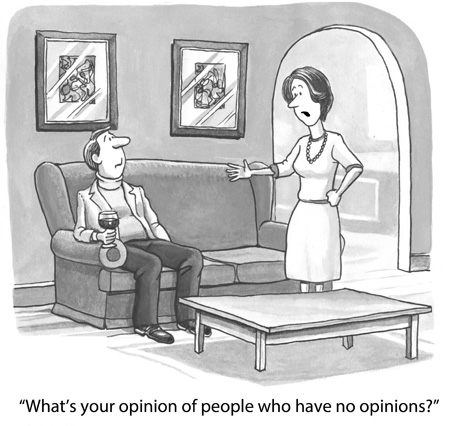The Professional Responsibility to Have and Share Opinions
Just recently, Rob had one of those conversations that sparked a long chain of thought. A colleague expressed the wish that professional associations for volunteer resource managers would ‘accredit’ volunteer management training in some formal way. The associations would vet and list ‘approved’ training providers so that their members would then be confident of hiring trainers who would deliver excellent learning experiences.
At face value, this seemed like a good idea. But, after further thought, Rob began to question both the appropriateness and the feasibility of the activity. He asked himself:
- What is the value of accreditation and to whom? Is this meant to be an endorsement of basic competence or a recommendation of excellence?
- Against what objective standards would the accreditation be done and do these standards relate to what makes for effective volunteer management?
- Who accredits the accreditors? Is it sufficient that someone be a member of the professional association or would other criteria have to be met?
- What if an organization or individual trainer is denied accreditation? Could this have legal repercussions in terms of affecting reputation and image?
- More basically, should a volunteer-run professional association spend (probably a large amount of time) accrediting training providers—especially if there are other, higher priorities? And what about limited financial resources?
- Aren’t there already other bodies whose purpose is accreditation of trainers and training? Might such groups be interested in adding volunteer management sessions to their list of reviewed subjects—so that the professional associations would spend time lobbying for such attention but ultimately would not have to reinvent accreditation itself?
Many years ago, Susan was actually involved in an attempt by the Association for Volunteer Administration to do something along the same lines. At the time, AVA’s certification program for volunteer resources managers required attendance at a certain number of continuing education sessions each year in order to remain certified; so it was decided that AVA should endorse relevant training. This endorsement was not meant as an assessment of quality, but rather approval that the training met certain basic criteria, particularly that the program would be taught by someone with legitimate credentials in volunteer management. It was up to the training sponsor to submit the paperwork applying for AVA endorsement.
What happened? Well, it was pretty time-consuming to administer, hard to promote among training providers, and—quite honestly—of dubious value to association members. But the intention was a good one: to help members find basic training and, possibly, to withhold endorsement from trainers who seemed to simply add “and volunteers” to any subject with no real expertise in what volunteer management is.
A Different and Feasible Approach
Rob pretty quickly decided that the negatives outweighed the positives in the proposal for a professional association to get into the accreditation business. However, he agreed with the need underlying the suggestion: volunteer resources managers would benefit from some way to assess if an offered training program has merit. So he came up with a better question: How could professional associations help identify good training opportunities in a way that was different from formal accreditation?
Rob’s idea is modelled on such consumer review sites as TripAdvisor, Yelp!, and Amazon customer reviews. Associations could use their existing Web sites to create a forum through which volunteer managers can rate and remark on any type of resources they encounter (training, journals, books, whatever). More than a general discussion board, the site could offer a rating form with standard questions and then organize submissions by type and name of resource so that users could easily find opinions when they need them. This informal approach would be much more cost- and time-efficient than an attempt at accreditation; the professional association would simply need to moderate the posts, following some basic rules not unlike those used when people post to discussion groups online.
Most importantly, it would empower the members of professional associations to have a say in who supplies the best training and development services for the field.
The Power of Publicly Shared Opinions
As the two of us discussed this issue, we saw its broader implications. Shouldn’t organisations that support people who lead and manage volunteers be doing more in general to empower their members? Just as we empower our volunteers, shouldn’t our associations empower us? Wouldn’t that move our field forward more quickly and effectively than it is doing right now?
Our Australian colleague and editorial team member, Andy Fryar, has an excellent presentation that’s all about the development of our profession. In it, Andy says this:
When I talk about the evolution of volunteer management, I talk about how historically we have evolved from being a ‘people profession’ to a ‘paper profession’. An evolution that moved us away from primarily having a focus on the volunteer to one where our focus is now on the process. For a while, we had this balance right. But in my opinion, we have now gone too far. It’s time for a new evolutionary direction. We need to find ways to become a ‘persuasive’ profession! We need to learn to influence, to develop key relationships, instead of simply just adding another volunteer to the team.
Andy is talking here about individual volunteer managers within their organisations, but the principle applies equally to our field as a whole. If we want to evolve to the next level as a profession, we have to become more persuasive, to influence and develop key relationships. And we need the courage and the tools to speak out.

Right now, the majority of places we can find opinions is in postings, especially blogs, written by consultants and trainers in volunteerism. For example, this quarterly spot in e-Volunteerism is called Points of View. We actually express some! And you, the readers, have a way to respond with your views and opinions. To us, this is a form of professionalism.
When was the last time you read anything critical or controversial—or taking a stand against something—on a national organization’s site? On a professional association’s site?
Granted, professional associations and peak bodies cannot do it all. They have limited resources and competing demands on their time. Also, it’s disturbing how hard it is to get volunteer resource managers to respond to anything publicly (we are well aware that we have not successfully moved our readers to post comments here in this journal, too). If we can empower our colleagues to take individual responsibility and risk speaking out, we could make professional progress much faster.
Voicing Individual Opinions
What can each and every member of our profession do to move our field forward?
First, each of us needs to make a commitment to volunteerism and to volunteer resources management as a career and not just a job. It has to matter to you enough to care about issues and want to contribute to addressing them. Once you have the conviction, believe in the power of the keyboard! Speak out in any number of ways:
- Participate in forums available to you already, such as Thoughtful Thursdays. Do you really not have time to write 140 character tweets?
- Similarly, respond to blog posts, journal articles, and other writing that welcomes reader comments. After all, we bet that you read the comments of others (you know you do). Give someone else a new opinion to read.
- Write letters to the editor (or web master or newsroom chief) in response to any news item that links to volunteering. Praise excellent coverage (which is a way to spread good ideas). Call out stereotypes and inaccuracies. Suggest alternative points of view. Right now, most media coverage of volunteer-related stories appear as filler or ‘good news’ fluff. Few readers/viewers give feedback. Let’s start.
- Respond to social media stories involving volunteers or volunteer managers. Again, say bravo when something good is shared. Support an expressed opinion if you share it or post an opposing view.
- Post your own story about volunteers or your concern about something affecting volunteers on your Facebook or LinkedIn page.
- Don’t just join online groups, participate! Waiting for other members to post something only means no one posts (except perhaps the moderator), which eventually leads to a group in name only. And if a colleague takes the plunge and shares something, respond!
Writing is not the only way to contribute to building our profession. Take every opportunity to educate others. Consider these avenues:
- Present information on the impact of volunteers, call attention to inaccurate statements about volunteers, and start thoughtful discussions about how volunteer involvement can be even more important in your organization.
- Respond to requests for proposals to present at conferences. Remember: You don’t have to be an expert or even a trainer. Propose a critical discussion topic and run the session to surface opinions.
- Accept nomination to a board position for your local professional association of volunteer managers or chair a committee or join the board of another non-profit as the volunteer ‘expert.’Advocate for more involvement of members and interaction with a wider public.
- Reach out to other professional organizations—social workers, teachers, human resources folks—and offer to exchange presentations. This lets you explain volunteer management to the people with whom we work every day yet who never learn the basics of what we do.
Conclusion
OK. We’ll stop now. Our intent is not to exhort you or instill guilt (well, maybe a tiny bit). We truly believe that a strong profession advocates for its beliefs and that members of that profession should take opportunities to express their educated opinions. We’ve shared a lot of ideas for how to do that and many are not overwhelmingly difficult or time consuming.
Want to start with a comment here? Let’s talk.



Chris Reed
Wed, 01/18/2017Jo Gibney
Wed, 01/18/2017Chris Reed
Thu, 01/19/2017Erin Spink
Tue, 03/07/2017Tracey O'Neill | Melbourne, Australia
Thu, 01/11/2024Oh my gosh Jo... look how far you've come?! Now a leading voice in our sector and even further afield through your coaching and your social media posts. You have become one of the colleagues that I love to engage with, and who makes me feel safe to share. Congratulations, and thank you!
Debbie Usiskin
Mon, 01/23/2017Dana Riley, Volunteer McKinney, McKinney, Texas
Tue, 01/31/2017Sue Hine, Wellington, New Zealand
Mon, 02/06/2017Deirdre Araujo, Exploratorium, San Francisco
Tue, 02/07/2017Deirdre Araujo, Exploratorium, San Francisco
Tue, 02/07/2017Susan J. Ellis, Energize, Inc., Philadelphia, PA
Tue, 02/07/2017Hi, Dierdre -- what a wonderful offer to others! You are quite right that some people would really benefit from a writing mentor. Great idea!
Here's Dierdre's e-mail address, for those of you who want to give her this volunteer opportunity: daraujo@exploratorium.edu
Best, Susan